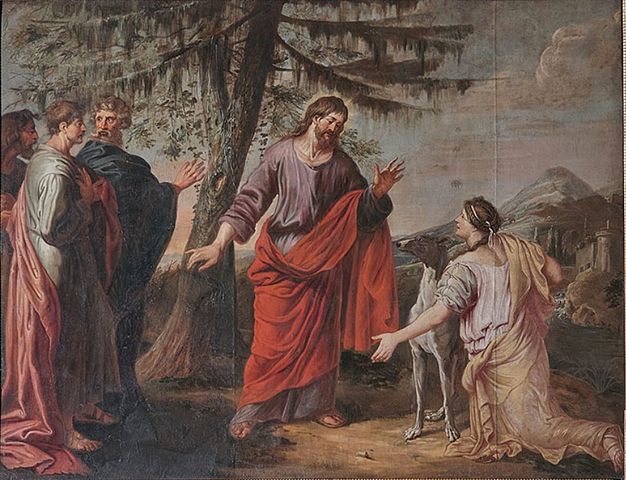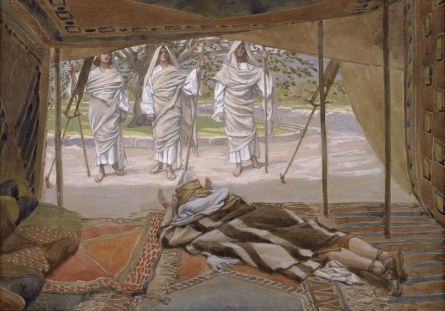In the beginning there was poop. God then molded the excrement into human form, which he then tickled. This caused his creation to laugh and come alive.
This is not my lame attempt at humor but rather the creation myth of aborigines of South Australia.[1] And the importance they ascribe to humor in the act of creation is not unique.
Hactcin, the God of the Jicarilla Apache, first created the animals, and laughed at the abundant variety of creatures roaming the earth, each with its peculiar habits and idiosyncrasies. It is said this is why people today laugh at the behavior of animals.
After a season, the animals convened a council and petitioned Hactcin saying, “We need a companion. You are not going to be with us all the time. We need someone like you to stay with us.” Hactcin obliged, creating man in his own image. But the man needed to be trained, so Hactcin said to him “Speak” and the man began to talk. “Shout” he commanded, and the man obliged. Lastly, Hactcin, said, “Laugh.” When the man chuckled and then guffawed, the dog was so happy he jumped up on the man’s lap, wagged his tail furiously, and then began to run around. [2]
For the ancient Egyptians, laughter was the act by which their deity created the world. He confronts Chaos and laughs it off, bringing forth a world conceived in joy. As recorded in an alchemical papyrus from the third century B.C., “When God burst out laughing there was light … When he burst out laughing a second time the waters were born; at the seventh burst of laughter, the soul was born.”[3]
The Greeks and Romans viewed human origins in similar terms. Unlike Genesis, which pinpoints Adam’s creation at the moment when God blew into his “nostrils the breath of life,” the ancients believed the act of birth is a two-stage process. The first occurs on the day you are born, the day you become human. The second takes place a few weeks later when you “catch your second wind” and laugh. On that day you become a human being. For Aristotle, this is a defining characteristic of our humanity. We are animal ridens, the “creature who laughs” and arguably the only one of God’s creations so endowed.[4]
So innate is our ability to laugh we put it on equal footing with the five physical senses. It is our sense of humor. We are often perplexed by those individuals who seemingly almost never laugh, who take everything we say literally. While the blind, deaf and mute retain all of their humanity, the “humorless” seem alien to us and communication with them is often awkward.
God has a well-developed sense of humor though you would never know it since he is always portrayed from the pulpit as a serious, somber and solemn being who never induces laughter, pokes fun at others, or participates in “light mindedness.” This is a failure of imagination on our part, one that blinds us at times to what the Lord is trying to teach us.
The most obvious example of humor in the Old Testament is the story of Jonah, which virtually all biblical scholars—both LDS and non-LDS—consider to be a work of satire and parody, albeit one that contains much wisdom.
Jonah tries to duck his mission call to Nineveh—the capital of Israel’s bitterest enemies, the Assyrians—by fleeing on a boat in the opposite direction. His escape is thwarted by a violent storm dispatched from the heavens but he would rather die than go to Nineveh, so he persuades his shipmates to throw him overboard. Even that fails when God sends a big ol’ fish to gobble him up and then vomit him back on the shore three days later.

Resigned to his fate, Jonah heads to Nineveh where he delivers the shortest, the worst, and yet most successful sermon in history: “Yet forty days, and Nineveh shall be overthrown.”[5] That’s all it took; the entire population immediately repented! Indeed, the King of Nineveh was so moved by his speech that he ordered everyone—and their farm animals—to fast and robe themselves in sackcloth and ashes.

Those cows must have thought: “It’s bad enough you wake us up every day at 5:00 a.m. to yank on our private parts with your cold hands. Now this?!? And if you are going to use us as dress-up dolls, couldn’t you at least outfit us in something more flattering, say a nice floral print?”
You would think Jonah would be proud of what he accomplished, but no. He’s distraught because God reneged on his promise to rain fire and brimstone on Nineveh. Now he has to wait until the Fourth of July to see fireworks. Indeed, his despair is so great that he contemplates suicide. And there the story ends.
Jehovah uses humor, exaggeration, and the logic of the absurd in this tale to teach the Jews that he does not favor them above all others.[6] It’s not all about them; only their mission is different—something we would do well to remember before claiming that other faiths only “play church” while us Mormons do the real thing.[7] Those who think they deserve to be inside God’s Kingdom will likely find themselves excluded.[8]
This fable also serves to remind us of Jehovah’s infinite grace and mercy, a divine mystery for us to contemplate.[9] The inhabitants of Nineveh rejoiced because the Lord had forgiven them and allowed them to live. Ironically, Jonah, who likewise owed his life to God, shows no appreciation. Nevertheless, God doesn’t give up on him. The question left unanswered at the end of this fable is, will Jonah give up on the Lord?
For Christ, humor was an invaluable teaching method during his earthly ministry, one he employed, for example, when he called out the scribes and Pharisees for their fanatical preoccupation with the minutia of the law at the expense of its spirit. He uses a series of metaphors to illustrate how his adversaries’ beliefs are incongruous with their actions (e.g., “for ye devour widows’ houses, and for a pretense deliver a long prayer”) and then delivers the coup de grâce: you “strain at a gnat and swallow a camel.”[10] It is not hard to imagine the laughter his perfect delivery elicited from the crowd.

The Healing of the Daughter of the Syrophoenician (Canaanite) Woman reveals how the Savior used misdirection, imitation, and mockery to teach his followers the lesson they failed to learn from the Book of Jonah.
The desperate mother approaches the Savior and his disciples pleading for help, but he ignores her. She becomes so annoying that his disciples beseech him, “Send her away for she keeps shouting at us.”[11] Refusing to yield, the woman blocks his path, begging on her knees for his help. Jesus reminds her that he was sent only to the lost sheep of the house of Israel and that “it is not fair to take the children’s food and throw it to the dogs.”[12]

Christ’s over-the-top insult seems to have tipped off the woman as to what he was up to. Without missing a beat, she steals the scene with her retort: “Yes, Lord, yet even the dogs eat the crumbs that fall from their master’s table.”[13] I’m confident Jesus gave her a wry smile and perhaps a wink. He promptly granted her request and, turning to look at his disciples, praised her “great faith.” At that moment, I imagine, they understood that Christ had channeled their thoughts and attitudes to reveal their prejudices.
Jesus favored stories over sermons as a means to induce change in the hearts of his audience. Those who had ears to hear, often found themselves smiling I suspect when they discovered how Jesus had subtly revealed a flaw in their character. Laughing at yourself serves as a reminder that you are not the person you want to be and is more likely to persuade you to change than someone incessantly beating the obedience drum in your ear.
Lastly, the laughter surrounding the birth of Isaac, the first and only son of Abraham and Sarah, teaches us something profound about God’s character. The couple were told of the coming addition to their family by three angels of the Lord, who said the child would arrive in the spring. But the parents-to-be could not imagine how this was possible since they were each closing in on 100 years of age. Not wanting to offend, they both laughed off the suggestion—which seems entirely appropriate in the face of sober realism. But they quickly learned God was quite serious.

The boy, at Jehovah’s direction, would be named Isaac, which is Hebrew for “laughter.” Some believe this was done to serve as a constant reminder of the couple’s initial skepticism, but Sarah’s words, at the time of Isaac’s birth, reveal a different purpose: “God hath made me to laugh, so that all that hear will laugh with me.”[14] And their laughter will be joyous because at the moment Jehovah decreed the child’s name he promised to establish his “everlasting covenant” with Isaac,[15] which is one the most pivotal moments in the history of Islam, Judaism and Christianity.[16]
The Lord actually invited the couple’s laughter by acting comically. By doing so, he encouraged them to see the world as place of limitless possibilities. In the words of Rector Petrotta, “Humor is possible at all because God creates and acts in non-predictable ways. God is willing and able to surprise us.”[17]
Jehovah knew how necessary humor would be for the survival of the Jews because of the tragedies they would endure for millennia. The Israelites coined a word—Mazel—to describe the sudden change in fortunes they experienced. Its original connotation was “destiny,” but over time it came to mean “luck.” Thus, the congratulatory greeting, mazel tov, means “good luck.” But literally, the word Mazel means “influence dripping down from the stars.”
I suspect this is why Tevye always looked skyward when he interrogated God. His questions were laced with both charm and irreverent humor, and he frequently cast himself in the role of Job forever asking, “Why me God? Why the Jews?” But he already knew the answer: “I know, I know. We are your chosen people. But, once in a while, can’t you choose someone else?” Later he says, “It may sound like I’m complaining, but I’m not. After all, with your help, I’m starving to death.”
Sometimes the heavens delivered the relief he requested but more often than not they responded with a dollop of bird guano on his forehead. But he gets it. Poop happens. He also realized that if he, like the aborigines in South Australia, could mold that poop into something beautiful and tickle it in just the right place, he might get God to laugh. Then, miracles will follow.
[1] Conrad Hyers, The Comic Vision and the Christian Faith: A Celebration of Life and Laughter, (Eugene, Oregon: Wipf and Stock Publishers, 2003), p. 13.
[2] Ibid, p. 14.
[3] Barry Sanders, Sudden Glory: Laughter as Subversive History, (Boston, Massachusetts: Beacon Press, 1995), p. 1.
[4] Ibid, pp. 3-5.
[5] Jonah 3:4 (KJV).
[6] See, e.g., Steven L. McKenzie, How to Read the Bible, (New York, New York: Oxford University Press, 2005), p. 19.
[7] In remarks he gave at a Mormon Youth Fireside at the Alpine Stake Center on February 4, 2022, Bradley R. Wilcox, second counselor in the Young Men general presidency, said his kids when they were young would “play church” the same way a child might play house. He then said, “And I used to think that’s so cute. But now I’m older I realize it wasn’t just cute. It’s actually what most people in the world are doing. They’re playing church.” In his view, everyone but Latter-day Saints lack the authority to do anything other than “play” at their faith. Jana Riess, “LDS Leader Brad Wilcox’s Apology for Racist Remarks Does Not Go Far Enough,” Salt Lake Tribune, February 16, 2022.
[8] Anthony J. Petrotta, God at the Improv: Humor and the Holy in Scripture, (Eugene, Oregon: Cascade Books, 2020), p. 130
[9] Ibid, p. 51.
[10] Matt. 23:24 (KJV).
[11] Matt. 15:23 (NRSV).
[12] Ibid, v. 26.
[13] Ibid, v. 27; God at the Improv, p. 129
[14] Genesis 21:6-7 (KJV).
[15] Genesis 17:19.
[16] Michael A. Screech, Laughter at the Foot of the Cross, (Chicago, Illinois: University of Chicago Press, 1997), p. xix.
[17] God at the Improv, p. 31.

Mission accomplished. I laughed several times while reading although I think paisley would go better with the cow’s eyes than a floral print. As you suggest, somebody needs to tell 95% of church leaders, priests, reverends, rectors, parsons, clergy, etc., about god having a sense of humor. They missed the memo.
They missed the memo indeed, Thorpe. Logic dictates that God must have a well-developed sense of humor. Otherwise we would all drive him crazy.
Beautiful—plus you used my favorite verse Gen 21:6 .
Heaven would be pretty boring without humor.
I agree with you, S. Stated differently, it wouldn’t be heaven without humor. (Gen. 21:6 is one of my favorites, too.)
You educate me once again. I had no idea that most Biblical scholars view the story of Jonah as satire, but that makes perfect sense. And I love being reminded of Genesis 21:6. The situation must have been hilarious (and touching at the same time).
Thanks, as always Doug, for your kind words.
I actually see more satire in the story of Jonah than others do. For starters, I think Yahweh uses Jonah to illustrate how even prophets sometimes do foolish things, something many members of my faith find it very difficult to accept, except in the abstract.
I also think he uses the Assyrians—who obviously did not remain faithful given their numerous subsequent invasions of Israel—to remind us that those who loudly proclaim “they have seen the light” and then make a public display of their abject humility are much more likely to become recidivists. It’s the woman who wrestles with her demons in the privacy of her own soul, and keeps trying even after she falters, that is more likely to change her character.